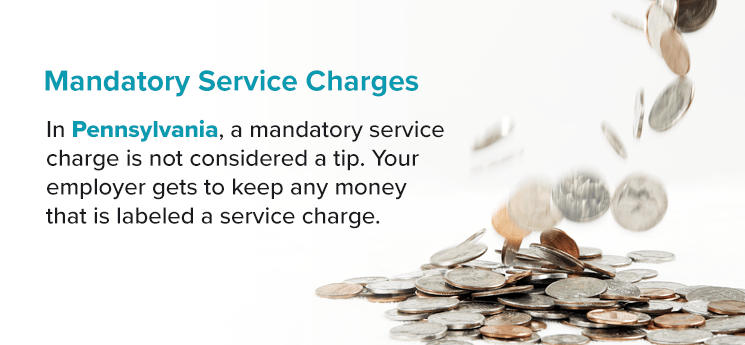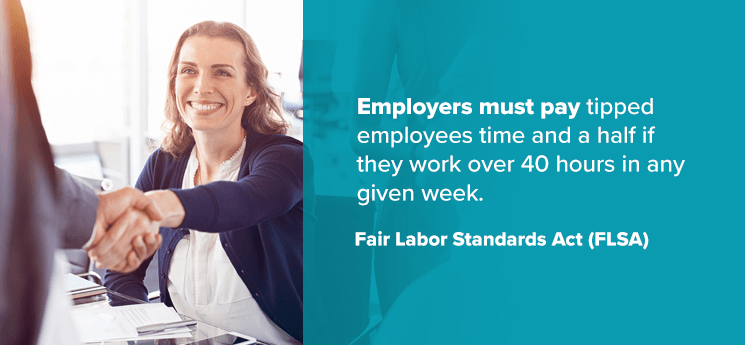By Larry Weisberg on December 24th, 2018
Many thousands of people in Pennsylvania work jobs where they are tipped regularly, including wait staff, bellhops, taxi drivers, hair stylists and bartenders, to name just a few. For some, it can be a quite lucrative profession that allows them to earn more than what their employer pays them. But for many others, they have trouble making ends meet.
If you work in a job that receives tips, you need to know how your job affects what you are paid, what exactly counts as a tip and whether you need to contribute to a tip pool. You can find more specific details at the Pennsylvania Department of Labor and Industry.
Here’s a quick overview of what we will discuss more in length below:
In Pennsylvania, tipped employees must be paid the state minimum wage which is $7.25 an hour. Employers can claim a tip credit. If they claim a tip credit, they pay you the cash minimum wage which is $2.83 an hour assuming you will make enough in tips to reach the minimum wage. If you do not, your employer is required to make up the difference. Employers can implement a tip pool, but it must cover all hourly workers who are paid the minimum wage, such as cooks and dishwashers in a restaurant. Employers may not keep tips for themselves or their business.
What Qualifies You As a Tipped Employee?
Pennsylvania uses the federal law, which says that if you receive $30 or more a month in tips, you are considered a tipped employee.
What Is Cash Minimum Wage?
Cash minimum wage is what employers can pay tipped employees in Pennsylvania. For 2019, cash minimum wage is set at $2.83 an hour. This wage assumes that a tipped employee will make enough in tips to reach the minimum wage level of $7.25 an hour. If the employee does not reach the minimum wage level, then the employer must make up the difference.
Who Owns a Tip?
Employees own their tips. Both federal and Pennsylvania state laws say any tips collected by an employee belong to the employee and not to their employer. Your employer can only ask you to turn over your tips in the following situations:
1. Employers Claim a Tip Credit
In Pennsylvania, your employer does not actually “take” your tip from you, but they do get to count those tips against the wages they pay you.
2. You Are Part of a Valid Tip Pool
Your employer can require you to pay at least part of your tips into a tip pool shared with other employees. In Pennsylvania, a tip pool must include all employees who are paid the minimum wage by the employer, such as cooks and dishwashers in a restaurant.
What Is a Tip Credit?
In Pennsylvania, employers must pay all employees the state minimum wage. Since Pennsylvania ties its minimum wage to the federal minimum wage law, that means that employers must pay employees at least $7.25 an hour. This has been the wage since 2009.
Pennsylvania employers can take a “tip credit.” If you are a tipped employee, your employer must pay you at least $2.83 an hour. This assumes that you will make enough from tips to reach the minimum wage level. That means that you must earn at least $4.42 an hour in tips for your employer to claim the tip credit.
However, if you do not earn enough in tips to bring your total wages up to the minimum wage level, then your employer must make up the difference.
Your employer also needs to inform you orally or give you written notice if they plan to take a tip credit. If they do not, you can keep all your tips plus be paid $7.25 an hour.
What Counts As a Tip?
This is where things can get a little fuzzy if you don’t know the rules.
If a customer pays you a cash tip and tipping is voluntary in your place of business, anything that the customer leaves you above and beyond what they have paid for their meal, newspaper, haircut or shoeshine is a tip. To be considered a tip:
- The customer must voluntarily leave the tip.
- Only the customer has the right to determine the amount.
- The employer cannot set the amount to be charged for the tip or negotiated with the customer.
- The customer determines who receives the tip.
But there are some situations where what most people consider a tip does not qualify as a tip under Pennsylvania law:
1. Mandatory Service Charges
It is not uncommon for a restaurant or a hotel to attach a mandatory service charge to the bill. For instance, some restaurants add a service charge for serving a party of eight or more, or a hotel may charge a fee for room service. Many customers might think the mandatory service charge, which is often as much as 18 percent or 20 percent, is the same as a tip.
This is not the case, however. In Pennsylvania, a mandatory service charge is not considered a tip. Your employer gets to keep any money that is labeled a service charge. While some employers may give part of this to their employees, they are not required to do so. It’s the employer’s choice.
The federal government has tried to implement rules that create strong incentives for employers to stop this practice. Since 2014, a portion of a mandatory service charge an employer gives to an employee must be treated as a wage and not a tip. So the employer needs to withhold some of that money for Social Security and Medicare plus pay their own share of these taxes, and they cannot claim a tip credit on them.
2. Credit Card Charges
If a customer uses a credit card to pay any service, many states allow employers to deduct the processing fee for using the card from the actual amount of the tip left by the customer. So if a customer uses a credit card that has a 2.5 percent processing fee, the employer can deduct 2.5 percent from the tip left for the employee.
There is no hard and fast law about this in Pennsylvania. It can depend on where you work. For instance, Philadelphia does not allow employers to do this. But other cities in other parts of the state do.
Can Employers Force Tip Pools?
In Pennsylvania, employers can form tip pools. In these cases, employers collect tips and redistribute them to the staff. But under the new legislation enacted by the federal government in March of 2018, a tip pool must cover the “front of house” staff as well as all employees paid the minimum wage. This means tip pools can be shared with employees who may work in the kitchen or in other positions that may not be visible to the public in any other business that accepts tips.
Can Employers Take Tips?
Employers cannot take tips. Previous outdated tipping rules changed when lawmakers slipped new regulations into the last few pages of the $1.3 billion spending bill signed by the President in March of 2018. Under the new rules, employers may not keep tips.
This was a bit of a turnabout by the government. It first proposed new rules in December 2017 that would have allowed employers to either pocket or distribute tips as they saw fit, as long as employees were paid the minimum wage. This meant that after an employee’s tips had reached the minimum wage level, anything extra could’ve been used by the employer as they saw fit, either to keep for themselves or to put back into the business.
Public outcry, however, was so great, the government changed its plans and instead implemented the rule that employers, supervisors or managers cannot keep their employees’ tips.
The government also added some teeth to its new rules. Any employer who tries to keep their employees’ tips could be subject to a fine of $1,100 for each violation in addition to paying back wages.
What About Tips Earned When Working Overtime?
As with any other employee covered by the Fair Labor Standards Act (FLSA), employers must pay tipped employees time and a half if they work over 40 hours in any given week. And employers cannot increase tip credits for overtime hours. In Pennsylvania, that means the employer may not take more than the allowed amount of $4.42 an hour in a tip credit.
What If an Employee Has Two Jobs for the Same Employer?
Sometimes an employee can work dual jobs for the employer. For instance, they could work as a maintenance worker for several hours during the day and then perhaps as a bartender in the owner’s restaurant at night. The FLSA will allow your employer to use a tip credit only in the hours that are spent when you are engaged in what is known as a “tipped occupation.” In our example, only the bartending position is a tipped occupation.
It also allows employers to take a tip credit on some of the time a tipped employee uses for duties that are related to the tipped occupation – for instance setting or cleaning tables. But if the employee spends more than 20 percent of their time in these related duties, the employer may not take a tip credit for these hours.
Signs That You May Be Underpaid or Losing Tips
It would be good if all employers followed the rules about making sure their tipped employees received the minimum wage. But sometimes, however, whether economic times are tough and the employer is struggling financially or they are just greedy, they will look for ways to shave the wages that are due to tipped employees.
It may not be your imagination if you believe this is happening to you. A 2017 study by the Economic Policy Institute of the 10 most populous states in the country, including Pennsylvania, found that about 2.5 million minimum wage workers are underpaid by $8 billion a year.
That works out to be about $3,300 a year for each minimum wage employee, roughly a fifth of what they are supposed to earn. The study found that the two worst states surveyed for underpaying their employees are Pennsylvania and Texas, where minimum wage employees can be cheated out of as much of 30 percent of their wages.
Here are a few signs that this might be happening:
1. You Consistently Work Overtime But Aren’t Being Paid for Overtime
You may notice your overtime hours are not on your paycheck. Or your boss may say they can increase the tip credit because you are working overtime. Both of these activities are illegal, and you should seek the help of a professional attorney as soon as you notice it happening.
2. Your Employer Didn’t Notify You of a Tip Credit
Your employer is required to give you verbal or written notification that they intend to take a tip credit. If they don’t, then they must pay you the full $7.25 an hour, and you get to keep all your tips. If you never received such notification, but you notice that your employer has implemented a tip credit, this is also illegal.
3. Your Employer Confiscates Your Tips and Only Pays You Some of the Tips You Earned
This is also illegal. But the survey we noted above found this happens frequently in Pennsylvania.
4. Your Employer Claims a Tip Credit but Doesn’t Make up the Difference If You Don’t Make Enough in Tips to Reach Minimum Wage
This is another frequent violation. Part of the problem here is that policing this policy is largely the responsibility of the tipped employees themselves, who may be reticent to confront their employers for fear of losing their jobs. Even employees who aren’t afraid to confront their employers about these discrepancies need to keep careful track of how many hours they work each week as well as the tips they received to calculate if they are receiving the minimum wage.
This is made more difficult because neither the FLSA nor the state of Pennsylvania specifies how weekly tips are to be calculated over a period of time.
The 2017 study found that tip workers have less total hourly take-home pay, must deal with greater discrepancies between what men and women earn, and have much higher poverty rates than workers who are not tipped or tipped workers who receive a minimum wage, are not subject to a tip credit and get to keep their tips. Restaurant workers, for example, have twice the poverty rate of nontipped workers.
If you believe that you are not being paid your full wage or that your employer is keeping your tips illegally, you should contact an employment law attorney as soon as possible.
Contact Weisberg Cummings, P.C. If You Believe You Are Losing Tips
if you believe your boss is cheating you out of your full minimum wage or is taking away tips that belong to you, one of the best things that you can do is get professional legal help.
At Weisberg Cummings, we work hard to protect your rights and your interests in situations where you believe you have been discriminated against or you are not receiving your full wage at your job. We will work with you and connect you with knowledgeable and skilled attorneys to counsel you.
From the moment you contact us, we will deal with you honestly and fairly to give you the most realistic idea what your options are. You can call us or contact us online where you can leave us your contact information and tell us a little bit about your situation. A member of our team will get back to you as soon as possible.





